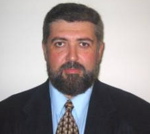Lou Chitkushev named MET computer science department chairman
College of Engineering alum plans to add graduate and online programs

With a mission to build on the prestige of Metropolitan College’s nationally recognized computer science department, Lou Chitkushev was recently appointed department chairman. Chitkushev (ENG’96), an associate professor of computer science, plans to “continue the strategy and path of academic excellence and growth,” he says.
Chitkushev brings to the position outstanding academic credentials and “sophisticated industry experience, with a strong commitment to applied, relevant research,” says Jay Halfond, dean of the Division of Extended Education and of Metropolitan College. “He is the model of the mature scholar-practitioner we seek in our faculty at MET.”
MET’s computer science department, established in 1979, has evolved from a traditional computer science program offering fundamental courses to a department that has ventured in state-of-the-art areas such as information assurance, telecommunications, medical informatics, computer information systems, biometrics, and digital forensics. The department currently offers seven degrees in the areas of computer science, computer information systems, and telecommunications, as well as eight graduate certificate programs and an international graduate diploma program in information systems and security. Computer science at MET has 8 full-time faculty and more than 70 part-time instructors and offers 150 course sections each academic year, including the summer term, with a total annual student enrollment exceeding 2,500.
“There are a number of new initiatives that we plan to implement over the next several years, such as graduate programs in information assurance, medical informatics — in collaboration with the BU School of Medicine — interactive multimedia, and project management of globally distributed software development,” says Chitkushev. “We also plan to develop new online programs in computer science and telecommunications.”
Progress in each of these areas, he says, is dependent on MET professors and instructors and their development. “In order to accomplish the ambitious plan of expansion and growth in all of these academic disciplines, the department needs to recruit new outstanding faculty and to address several very important areas that are critical for its success: full-time faculty teaching load distribution, online course development compensations, and staff and research support for faculty,” he says. “In addition, faculty promotion criteria and career paths have to be clearly defined. In parallel, we need to revise and develop part-time instructors’ development strategy, as their role will continue to be very important in the future of the department. Overall, as outlined in our mission statement, I think we should be devoted to remaining the first choice for students dedicated to continuing academic development regionally and committed to be leaders in focused areas of computer and information sciences education globally.”
Chitkushev is a cofounder and the associate director of BU’s Center for Reliable Information Systems and Cyber Security (RISCS), which held its first symposium in April, and he played an active role in the initiatives that led to BU’s designation by a program administered jointly by the Departments of Defense and Homeland Security as a National Center for Excellence in Information Assurance. He has also served on several conference committees of the Institute of Electrical and Electronics Engineers and is a review panelist for the National Science Foundation.
Regarding Chitkushev’s role in founding RISCS, Tanya Zlateva, MET associate dean for academic programs and former computer science department chairwoman, points out that he “was one of four faculty who started the information security curriculum development that led to national recognition of BU’s work in the field.”
Chitkushev came to MET in 2002 after working as a senior technology advisor at Telcordia Technologies, in Piscataway, N.J., and as a research scientist at the same company when it was known as Bellcore-Bell Communication. He also served as a technical consultant for Foster Miller, of Waltham, Mass., and Eye World Vision Professionals, in Newton, Mass. He earned a doctoral degree in biomedical engineering from the College of Engineering, a master’s degree in biomedical engineering from the Medical College of Virginia, and a master’s degree in engineering and a bachelor’s degree in electronics and telecommunications from the University of Belgrade. His research interests are in telecommunication and computer networks, information security, and biomedical informatics. He has written more than 30 papers in professional journals and for conferences.
“He has high academic standards,” says Halfond, “with a sensitivity to what our working professionals need to know to be at the forefront of their fields.”